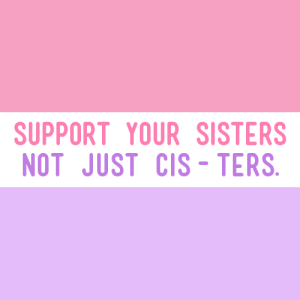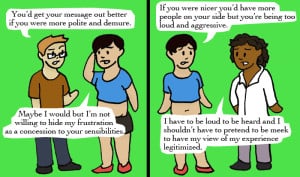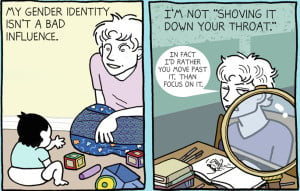Originally published on Paging Dr. NerdLove and republished here with the author’s permission.

Source: iStock
Back in October 2013, when this piece was first published, it was an interesting week for talking about masculinity.
To start with, ABC’s 20/20 aired a story about the Manosphere and the Men’s Rights Movement (MRM)- which, ironically enough seems to have touched off a weird Jay-Z/Nas-esque feud between two leading voices of the MRM.
The Daily Beast provided a thoughtful, if somewhat flawed, report on the MRM, including some of the grievances and injustices it claims to be trying to remedy in today’s society while Jaclyn Friedman wrote about her sit-down with one of the MRM’s loudest gadflies.
What makes it fascinating to me is watching these various figures trying to be firebrands and movement leaders, addressing the feelings of inadequacy and lack that many men are experiencing through articles like “Women Are The Natural Enemy of Men.”
They are accusing (literally) random women of falsifying rape charges and generally flailing about flinging shit everywhere like a tweaked-out mountain gorilla taking pot-shots at Italian plumbers.
The most frustrating thing is that, frankly, the MRM isn’t entirely wrong… or at least it wouldn’t be if they were actually trying to help men instead of looking for excuses to keep hating on women.
There are legitimate grievances to be had over the way that, say, child custody in divorce tends to favor the mother even if she’s otherwise unfit, or the way that adult male victims of sexual abuse or rape are functionally ignored by both society and law enforcement.
The problem is that the MRM types are so up their own asses with their hatred and fear of women that they resemble a one-man Human Centipede. They’re directing all of their efforts in the wrong direction.
It’s not women who are the problem. It’s men. More specifically, it’s patriarchal toxic masculinity.
The traditional societal definitions of masculinity – and its attendant gender roles – fails men.
The Inherent Fragility of Patriarchal “Manhood”
Let me ask you a serious question: Would you want to be part of a system that sets standards that are literally impossible for many – if not most – people to achieve?
What about one where you’re expected to be always on the verge of violence?
One where the only acceptable emotion is perpetual anger?
One that requires that you sever or truncate most of your emotional relationships in pursuit of membership? Especially when your membership is continually in danger of being stripped from you through random circumstance?
Because that’s part of the concept of “a real man.” I’ve written about this before: the definition of “masculinity” pitched to men – especially young men – is one of violence, social dominance, anti-intellectualism and aggressive, even uncontrollable, sexuality.
“Toughness” and stoicism are the only acceptable forms of expression besides anger and danger is the only worthwhile pursuit. Respect isn’t earned so much as taken, only to be given when you’ve impressed others sufficiently with how tough – how manly – you are.
Part of what’s amazing about the modern concept of masculinity is how fragile it is; being a man isn’t something inherent so much as it is things that you do. In PUA and MRM circles, everyone talks about being “alpha” (which, ironically enough, doesn’t even exist in nature...) but “alpha” is a nebulous and ever-shifting set of behaviors, rather than some natural state of existence.
It may be “not taking shit from other dudes” as easily as “fucking lots of women” or “having the flashiest job”…all of which means that being alpha is a temporary state at best. Every so-called “alpha” is just a “beta” waiting to re-emerge.
Every “real man” is in constant danger of being downgraded back to “pussy” or being somebody’s “bitch.”
After all, when manhood is something you do rather than part of who you are, that means that it can be taken from you.
We hear this all the time when men who act insufficiently masculine – acceding to a spouse’s desires, not finding some woman sufficiently sexually alluring, expressing a stereotypically feminine interest – are told to “turn in their man card” or they’re asked if they “left their balls at home” or “in their wife’s purse.”
It’s an expression of the idea that manhood is an inherently insecure position that others can revoke at any time. A moment’s vulnerability or non-stereotypical male behavior means that suddenly you aren’t a “real” man until you can reestablish your masculine bona fides. More on that in a moment.
One of the most common ideas of “manhood” is the idea of “man as provider.” A man, we are told, provides for his family no matter what it costs him. The problem, of course, is that once again, this reduces manhood and masculinity into an external factor, something that can be taken… or destroyed.
If a man is defined by being the provider (and it’s always the provider, not a provider), then he is perpetually at risk of losing his manliness. If your status as a man is dependent on your financial situation, then your manhood is entirely at the whim of your employer; with the stroke of a pen, they can rob you of both job and metaphorical testicles.
An economic downturn – something the average man can’t avoid or guard against – can destroy entire generations of men by casting them out into the street, powerless eunuchs desperate to regain their former status of “real men” at any cost.
We see this fear reflected over and over again in our pop culture – be the One Who Provides, no matter what it costs you.
Jax Teller can’t leave the Sons of Anarchy, no matter what the club has cost him in blood and suffering, because he can’t stand the idea of being a half-rate mechanic dependent on his more successful wife.
Walter White sacrifices everything – love, family, everyone he knows – on the altar of “provider” because it’s about being a man rather than how much he cares about the people he’s supposedly trying to support.
They cling to the altar of manliness because that’s what you’re supposed to do no matter what it costs you – or, ultimately, the people around you.
And like so many other men, they live with the constant dread that this could all go away.
To Be a Man Means To Be Afraid
The brittle fragility of manhood means that men must always be on their guard against moments when their masculinity might be destroyed.
A moment of weakness means that it can all come crashing down around your ears – handing in your man card and accepting your position as “bitch.”
As a result, any vulnerability must be defended against because weakness means that somebody else will take your power – your manhood – away.
A slight against your power or status must always be answered or else you will be tacitly acknowledging that you are that person’s bitch.
You have to establish your alpha dominance in the group by taking away other people’s power, or else they are in a position to take yours.
There is no in between when it comes to manhood – you’re either a man or you’re a pussy, no in-between. And the most common way of establishing this power? Violence and the threat of violence.
If you ever stray into MRM boards or witness the way the way they respond to visible feminists like Amanda Marcotte or Caroline Criado-Perez or Anita Sarkeesian or any other female writer you might care to name, then you will notice that the threat and promise of violence is ever-present.
Even threads on MRM subreddits complaining about one’s divorce quickly devolve into “well, the best way to handle it is to kill her,” with increasingly specific suggestions as to how. It’s because they feel threatened by these women – a moment of vulnerability – and now they need to re-establish themselves by punishing them for daring to make them weak.
Violence and the willingness to use it is a key part of the stereotype of masculinity; we’re supposed to respect the meat-eating badass who breaks heads with his bare knuckles, not the vegetarian who tries to avoid conflict in the first place.
All the moments in Breaking Bad that are calculated to make us want to punch the air and shout “fuck yeah” involve Walt threatening horrific violence on people.
Being willing to apply violence becomes a key part of establishing why people should respect us. It’s a quick and easy way of saying, “Yes, I’m a manly man.”
In fact, much of homophobic and transphobic violence is inspired by the need to reassert one’s manhood; queer and trans people threaten their beliefs of masculine identity and behavior and thus they lash out as a way of reaffirming their status as “man.”
But even when violence isn’t the immediate go-to answer, men are in constant fear of seeming weak and attempt to hide or diminish anything that detracts from being a man.
Another aspect of being a man is that a man is always rock-hard and ready to use that steely erection at a moment’s notice.
But – as all men know – there are numerous times when an erection is almost impossible to achieve whether due to stress, health, alcohol or performance anxiety.
Once again, one’s existence as a man is in danger because if you can’t get it up to fuck some bitches, you simply aren’t a man.
As a result, Viagra and Cialis remain some of the most profitable drugs of all time, while other men turn to dubious and potentially life-threatening herbal supplements and “male enhancement pills” to firm up flagging erections.
Because not being ready to fuck at a moment’s notice makes you more like a woman… the ultimate insult.
Of course, the problem isn’t that women are going to judge them – in fact, women are far more likely to forgive whiskey-dick, especially if he’s willing to apply himself in other areas – but other men.
It Means Men Can’t Trust Each Other
You see, women aren’t the enforcers of traditional gender roles. In fact, modern feminism means that women are far more encouraging of being willing to step outside of typical gendered behavior.
No, the gender police in this case are other men. Men are incredibly quick to pounce on gender-atypical behavior and to punish others for it.
Because being a man is a binary situation – you either are or aren’t – being willing to enforce the dictates of masculinity on others is one of the surest ways to show others that yes, you are a man. It’s a way of stealing somebody else’s dominance.
And if you’re not a man, you’re a woman.
The most damaging insults men throw at each other – faggot, bitch, pussy – carry connotations of femininity and weakness.
The so-called “Man Crisis” that (mostly male) pundits whinge about complains that men are “refusing” to grow up to take the traditionally heteronormative path of their forefathers and instead are becoming perpetual adolescents – or worse, fags instead of rippled He-Men demanding all the eggs and bacon they can get and growing luxurious facial hair.
Their complaints about the dearth of manliness is part of the social script for correcting gender variant behavior: mocking the people who diverge from the traditional role and exhorting others to guide or coerce them – sometimes violently – back to the role of hairy-chested manliness.
The punishment for non-masculine behavior can be as overt as mockery or violence or through subtle sabotage.
A 2010 study from Rutgers University found that men who abandon “macho” behavior get punished by others. In this case, less macho and self-promoting men applying for jobs suffered from social backlash from prospective employers.
Modesty in men was seen as weakness, while it was rewarded in equally competent women applicants.
Since being femme or otherwise un-masculine for even a moment means being kicked out of the Man Club, it becomes almost impossible to open up and be honest with other men.
When deviation from the accepted role leads to any reaction from social approbation to exclusion to violent correction, you’re left forever guarding against the possibility that someone might realize you’re having doubts or fears.
Worse, you have to reestablish your man cred, usually at the expense of the other person, further eroding the trust and openness necessary for emotional intimacy and friendship.
Every expression of emotional openness needs to be followed by some reminder that you’re still a man at some level, even amongst the people you are closest with – thus the symbolic violence of the three-beat “man pound” that accompanies hugs between guy friends or the profoundly sophomoric declaration “no homo.”
You can only open the door so far, even amongst the people whom you trust, before having to slam it home again and pretend that you don’t repress your emotions as much as possible.
Masculinity Makes It Harder to Get Laid
One of the unintended side-effects of the rigid enforcement of traditional gender roles is that it ruins our sex lives.
The traditional gender divide insists that men are hypersexual beings, insatiable satyrs who can’t restrain themselves and would fuck anything that was warm enough and provided enough friction.
Men, so the theory goes, are perpetually walking the knife’s edge of sociability, always one exposed ankle or glimpse of cleavage away from being unable to contain their urges.
Women, meanwhile, are passive, the receptors to male sexuality. They neither enjoy nor want sex as much as men do, preferring emotional intimacy to physical intimacy.
Since men are continually primed for sex, women are the designated guardians of sexual propriety and must regulate men’s sexual desires for them by not giving them the opportunity to fall from grace.
In reality, women are equally as lustful as men, if not more so. In fact, most women would like to be as sexually open and aggressive as men are, but the social script won’t allow it.
Men often complain about having to be the aggressors, lamenting over and over again that women don’t approach men and thus have all the power in the sexual arena.
Many insist that women don’t approach simply because they appreciate being the choosers, preferring to make men dance in attendance on them, leaping through hoops in order to prove their sexual worth.
The truth however is simply that women don’t approach men for sex as often because men tend to get profoundly uncomfortable when gender roles are reversed.
Men tend to either find sexually aggressive women intimidating and off-putting or else far overestimate the woman’s level of interest – turning “Hi, what’s your name” into “Fuck me in the bathroom right now.”
That lack of communication between genders is part of what leads to men getting themselves stuck in The Friend Zone. Traditional masculinity makes it more difficult for there to be legitimate friendships between men and women.
Men, after all, supposedly can’t be friends with a woman without sex inevitably getting in the way.
The socially mandated distance – when every non-sexual relationship between men and women is predicated on dishonesty by definition – makes it harder for men to actually communicate openly and honestly with women and understand how women are socialized to communicate.
As a result, men are prone to misreading signals, assuming interest where none exists, or being unable (or unwilling) to take friendship for friendship’s sake rather than a way to backdoor their way into her panties.
Of course, it doesn’t help that the dominant sexual narrative is of the commodity model of sex – where a woman’s intrinsic value is based on the sex she doesn’t have.
A woman who is willing to be the aggressor implies that she’s had other partners before, marking her as too easy and a slut. After all, if she’s been less discriminating in her partners before, then it means that her current partner (i.e. you) isn’t special.
He’s not the person who managed to seduce her or is so amazing that he was able to overcome her innate resistance to sex. He’s just another ride on the “cock carousel” as some MRM wags have termed it.
Traditional gender roles also encourage the perpetuation of rape culture – where rape is normalized or even condoned by societal mores.
The dominant narrative – as seen in the Stubenville and Maryville assaults and with Reteah Parsons – is still to place the blame on the victim; she shouldn’t have been drinking, she should have known better, what did she think was going to happen at a party full of boys?
The message to women is that men can’t or won’t restrain themselves when presented with the opportunity to fuck somebody, consent be damned and, thus, women have to guard their own virtue.
Women who might otherwise be open to a casual sexual relationship or a one-night stand with somebody are far less likely to act on that desire when the social and physical risks outweigh the potential benefits.
As the saying goes: Men are worried that women will laugh at them, while women are worried that men will murder them.
Masculinity is Literally Hurting Men
The most insane aspect of traditional masculinity is that it literally hurts men.
One of the most notorious aspects is the treatment of male victims of abuse, assault and rape. They are almost functionally invisible to the justice system. It’s estimated by The Rape, Abuse and Incest National Network that boys and men make up at least 10% of sexual assault and abuse victims.
I say “estimate” because it’s almost impossible to get accurate numbers. There haven’t been any studies funded to track the issue, and little apparent interest in starting one.
The majority of sexual assault victims in the military aren’t women, but men… a fact that largely went unreported until recently.
Because being a man means never showing weakness, men are even less likely to report their rape to the authorities than women.
Being assaulted – aka being made “somebody’s bitch” – is the ultimate sign of having your masculinity stripped away from you and most victims can barely process the humiliation that comes with that.
And in a cruel twist of irony, men reporting their assaults are just as likely to get the same smirk and victim-blaming attitude from the police as women are.
After all, a big, strong man should’ve been able to fend his attackers off. He must have wanted it.
The dominant idea that men welcome any and all sexual opportunities offered to them means that male victims of sexual abuse and statutory rape are also ignored by the authorities, especially if the perpetrator is a woman. It tends to be seen as a victimless crime at best or the young boy was lucky to get laid.
Chris Brown is one of the most notorious examples – he tries to sell it as being so sexually precocious that he was able to seduce a woman nearly twice his age instead of calling it rape.
The idea that boys are perpetually horny overrides the damage, the confusion, shame and humiliation that sexual coercion and exploitation can do to them. It makes it that much harder for the victims to even understand what had been done to them, never mind get help.
Unsurprisingly, it’s the fragile nature of masculinity and the constant need to be forever on one’s guard against the potential consequences of gender atypical behavior that takes greatest toll on men.
A study on masculinity and aggression from the University of South Florida found that innocuous – yet feminine – tasks could produce profound anxiety in men.
As part of the study, a group of men were asked to perform a stereotypically feminine act – braiding hair in this case – while a control group braided rope. Following the act, the men were given the option to either solve a puzzle or punch a heavy bag.
Not surprisingly, the men who performed the task that threatened their masculinity were far more likely to punch the bag. Again, violence serving as a way to reestablish their masculine identity.
A follow-up had both groups punch the bag after braiding either hair or rope. The men who braided the hair punched the bag much harder.
A third experiment, all the participants braided hair, but were split into two groups. Those who got to punch the bag afterwards and those who didn’t.
The men who were prevented from punching the bag started to show acute signs of anxiety and distress from not being able to reconfirm their masculinity.
It’s that precariousness – the ease of which one’s perceived manhood can be taken away that has profound physical and mental effects on men.
The constant state of being on guard wears away at the body and spirit, contributing to numerous health issues. The stress and constant need to reassert one’s masculinity has been linked to hypertension, depression, anxiety and low self-esteem as well as an increased propensity for violence.
It is literally killing men by insisting they can never show weakness, never vary from the restrictive role laid out for them.
Trapped In The Box
It’s more or less inevitable that there will be people insisting that I hate men, that I’m sucking up to women in hopes of getting laid1 or that I’m a beta male trying to bring down my alpha betters.
To which I reply, no, I want to help.
I want to see a world where manhood isn’t something that can be taken away or lost, and day-to-day existence isn’t about trying to shove everybody into the same inflexible roles, constantly having to repress their feelings and living in fear of having a vulnerable moment.
We can make manhood into something inherent instead of something that we’re constantly having to prove, where the only value you have is your willingness to hurt other people who dare to step out of line.
Something where men aren’t constantly living with the never-ending anxiety instead of contentment and self-assurance and afraid to be themselves and where simply trying to be a man doesn’t end up causing us more damage than any imagined feminist agenda ever could.
The traditional idea of masculinity has failed us.
It’s time to be better than we are.
[do_widget id=’text-101′]
Dr. NerdLove dispenses love, sex and life advice for geeks, otaku, dweebs, poozers, nerds and the occasional neo-maxie-zoom-dweebie. Making geeks sexier since 2011. Check out his website here and follow him on Twitter @DrNerdLove.
Search our 3000+ articles!
Read our articles about:
Our online racial justice training
Used by hundreds of universities, non-profits, and businesses.
Click to learn more




















